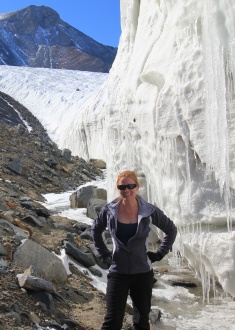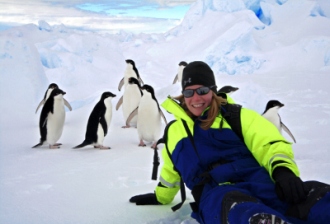About
I’m Alex Mass, an Environmental Engineering graduate student at the University of Colorado. I’m currently living in the Transantarctic Mountains of Antarctica for my fourth research season on the Ice. (During my first season I worked on an Antarctic Icebreaker, I spent my second season living on the ice sheet of the high Antarctic Plateau, and my third season in a different McMurdo Dry Valleys Transantarctic fieldcamp.) In addition to my research, I do STEM educational outreach both locally and internationally, talking to kids about fieldwork in Antarctica, and this blog was created in order to explain a bit about what life is like on the Ice. I wrote this blog to apply to a broad, general audience, but have provided ‘hoverlinks’ that define the vocabulary terms for kids by hovering over the highlighted word.
SCIENCE/ RESEARCH FAQ:
What is your research about?
I study the deposition and degradation of semi-volatile halocarbons in glacial water. Antarctica has a series of unique ecosystems farther away from anthropogenic (man-made) sources, which allows me to study contamination that has traveled to a ‘clean’ environment from other areas of the world. Sunlight, gas exchange, and chemical cycling processes within glaciers also affect how contaminants travel and break down in cold environments, and I’ll try to use the information I gather in Antarctica to make comparisons to the populated world, where many of the world’s population get their drinking water from snow and glacial melt which feed major river systems. This topic is important in order to get a better understanding of how pollutants travel, change, break down, and affect climate change, drinking water quality, and human health world-wide.
What did you study in school that helped you work in Antarctica?
I think fieldwork opportunities rely on a mix of 2 things; relevant science education and a good fieldwork background. I did a triple major in Biology, Anthropology, and Environmental Sciences at my university. During that time I did a number of field projects and found myself most interested in investigating pollutants that leach into water and streams. This led me to work on a masters degree studying environmental toxicology and marine sciences, working onboard the Icebreaker Oden for Season 1 of this blog. I also spent quite a few years during and after college working as a backpacking guide and Emergency Medical Technician (EMT), which gave me great hands-on field experience helpful for jobs in fieldwork. (Personally I think medical training is a HUGE benefit when applying for any outdoor/ field jobs.)
After that first year working on the Oden I fell in love with Antarctica, applied to labs specializing in my field (halocarbon deposition and degradation in polar and alpine regions) and did a second masters in Environmental Engineering working on the Antarctic High Plateau for Season 2 of this blog. I’m currently working on my PhD work in environmental engineering, including the same concepts of toxicology; measuring harmful chemicals in the environment, how they got there and how they break down over time, but now in the Dry Valleys of the Transantarctic mountain range (Seasons 3 and 4 of this blog). Work in the Dry Valleys is ‘fieldcamp’ based, and I’ll be living out of a tent for three months November 2014- early February 2015 for my fourth season.
How can I get a job in Antarctica?
I get this question a lot, and because my work is very specifically tailored to my individual PhD, I can’t personally help you get a job here. However, my general advice is that if you want to do scientific research in Antarctica, you should search for university labs that do polar work and apply there- there a large variety of labs so it would be best to find one tailored to your specific interest, which is what I did for my PhD. Most labs use graduate students (MS/PhD students) for fieldwork, but some do hire lab techs with a Bachelor degree; you need to search for these on an individual basis. The Antarctic stations are run by Lockheed Martin, a government subcontractor run out of Littleton, CO. If you’re not a scientist and are looking for support positions you can search their website for job openings for logistical positions (most of which require previous training) like flight operations, etc. Jobs like line cooks and janitors are hired by companies subcontracted by Lockheed, but since those contracting policies change it would be better to use Google for the most updated results. Due to the large number of emails I get asking about jobs, my lack of ability to actually hire anyone, and my very limited email access in Antarctica, I’m sorry but I will not reply to emails/ messages asking about finding jobs in Antarctica. Please understand that I get an overwhelming number of jobs questions and this is not the right place to ask for a job. Google is a far better search tool for jobs than I could ever be. If you have any questions on life in the field though, feel free to ask below!
–
ANTARCTIC FAQ:
Why is there 24 hours of daylight in Antarctic summer/ why is there no sun in Antarctic winter?
Since I’ve been asked this question a lot, I made a video to explain Antarctic seasons here.
Are there native or ‘regular people’ live in Antarctica? Are there children or schools there?
No. Antarctica has been preserved by the Antarctic Treaty to only support scientific research, and so while there are a number of different countries with research stations on the continent, there are no native people on the continent and no people who live there ‘normally’. Everything in Antarctica is designed for the support of scientific research only.
Are there polar bears in Antarctica?
No. Polar bears only live in the Arctic, and penguins in the Antarctic. (Although there are some penguins as far North as the Galapagos Islands, but not as far North as the Arctic.) In fact, the name “arctic” comes from the greek work arktos, which means ‘bear’. It referred to the fact that sailors could see the Ursus Major and Ursus minor (bear) constellations best from above the Arctic Circle, long before most Europeans had ever spotted an actual polar bear there. Because Antarctica is on the opposite side of the planet from the Arctic, it was named Antarctica as in “Anti-Arctic” or the opposite of the Arctic. So the name Antarctica ‘opposite of the land of bears’ is fitting, because there are no polar bears here, although it’s really a coincidence because polar bears hadn’t yet been discovered by most Europeans when these names were determined.
Why is the Arctic called THE Arctic, but Antarctica is not THE Antarctic?
This comes from an old Latin/Greek tradition to give oceans neutral or masculine endings, but give land feminine word-endings. For instance, America is land and the Atlantic is an ocean. Likewise, Antarctica is a continent and the Arctic is an ocean. Canada, Greenland, Siberia etc. are all areas of land that border the Arctic ocean and so people call that area ‘the arctic’, but that is referring to a region near the Arctic ocean, not a specific parcel of land. The North Pole is over sea ice in the Arctic ocean. Comparatively, the South Pole is over land, Antarctica is a landmass, and it was given a feminine name. The ocean surrounding Antarctica where the Atlantic, Pacific, and Indian ocean all meet and swirl together below the Antarctic Circle (the 66.33’44” degree S latitude) is called the Southern Ocean.
Questions? Ask below!


Alex, thank you for sharing your fascinating experiences, I came across this by way of your posting on Reddit. You are, it seems, essentially visiting another world, or should that be, forgive the pun, part of our world ‘frozen’ in time. As somebody with an interest in such research, but no scientific background, and with growing concerns for our seemingly ever more fragile foothold on this exotic mass of dust and rock, I find such research both compelling and awesome. Excellent images all round – that close-up photo of the sled track looking at the Concordia Station (season2) grabbed my attention – the fractal-like way the nearest crumbling fissures in the smooth track resemble the wider antarctic landscape makes it a striking image (imho). What gets me is that while human endeavors into space get all the headlines and attention folk like you are busy working away in generally hostile conditions doing such vitally important work and seldom get noticed – may your blog flourish. All the best Ryan.
The Arctic and Antarctic regions of our planet are truly fascinating; thanks for sharing your experiences!
Hi Alex,
my name is Steffi, currently living in NY and part of a theater project which takes place at McMurdo, Antarctica. We are searching for someone from there, who would be interested in talking about their life and work there (via skype). could you imagine to skype with us and tell us from your experiences? all the best Steffi
Hi Alex!
I saw your post on Reddit and was curious to know if you were interested in Skyping into our 6th grade science classroom. The students are studying biomes and are keen to speak to someone working in Antarctica.
Hi Alex,
We met at the Chicago NGSS Conference and we discussed the opportunity of having you Skype a summer STEM program for girls. Our students are studying the work of scientists all over the world and their impact on the planet and you would be an awesome role model! There are two sessions that are two weeks long for girls ages 11-14. One is in June and one is in July. I’ve included my website below but the program is through Harper Community College in Schaumburg, IL. Love what you are doing! Chris
Hi Alex! I saw your post on Reddit “skyping an Antarctic scientist”. I am a Year 5 teacher in Australia and our class is learning about all things Antarctic and we would absolutely love to speak to an Antarctic scientist! Would we be able to set up a Skype interview with you sometime in the next 10 weeks?
Hey Alex,
Working on a novel that centers around Vostok. Concordia, being the closest base to it, figures large in the story. I just wanted to let you know your blog is one of the major jewels I have found in my research. There are some other great ones, but The Last Degrees is right there with three or four others.
Love your take on everyday life there. Digging around in the expired cereal bin was too funny.
Again, just wanted to say thanks for the time you put into this.
mk